
PHYTOPATHOLOGIA MEDITERRANEA
Scope & Guideline
Championing open access to vital plant research.
Introduction
Aims and Scopes
- Plant Pathogen Identification and Characterization:
Research often focuses on identifying and characterizing various pathogens, including fungi, bacteria, and viruses, that affect agricultural crops. This includes studies on their genetic diversity, pathogenicity, and interactions with host plants. - Disease Epidemiology and Management Strategies:
The journal emphasizes epidemiological studies that monitor disease spread and impact, alongside evaluations of management strategies, including chemical, biological, and cultural practices to mitigate plant disease risks. - Biocontrol and Resistance Induction:
There is a strong emphasis on exploring biocontrol methods and the use of natural products to induce resistance in plants. This reflects a growing interest in sustainable agricultural practices. - Impact of Environmental Factors on Plant Health:
Research often examines how environmental conditions, such as climate change and soil health, influence plant-pathogen interactions and disease development. - Emerging Diseases and Novel Pathogens:
The journal is dedicated to reporting on newly identified diseases and pathogens, especially those that threaten established agricultural systems.
Trending and Emerging
- Molecular Techniques for Pathogen Detection:
There is a notable increase in the application of molecular techniques, such as qPCR and high-throughput sequencing, for the detection and characterization of pathogens. This trend underscores the need for rapid and accurate diagnostics in managing plant diseases. - Microbiome Studies in Plant Health:
Emerging research on the role of plant-associated microbiomes in health and disease is gaining traction. Studies exploring how the microbiome can influence plant resistance and disease outcomes reflect a growing interdisciplinary approach. - Climate Change Impact Assessments:
Research focusing on the impacts of climate change on plant disease epidemiology is on the rise. This trend is crucial for developing adaptive management strategies in a changing environment. - Biological Control Innovations:
The journal is increasingly publishing studies on innovative biocontrol methods, including the use of microbial consortia and natural plant extracts, to manage plant diseases sustainably. - Investigations into New Pathogen Threats:
There is a growing emphasis on identifying and understanding new and emerging pathogens affecting various crops. This trend highlights the importance of vigilance in monitoring plant health threats in a globalized agricultural landscape.
Declining or Waning
- Traditional Chemical Control Methods:
There seems to be a waning interest in conventional chemical control methods as researchers increasingly focus on integrated pest management and biocontrol strategies. This shift aligns with a broader trend towards sustainability in agriculture. - General Reviews on Established Diseases:
The journal has seen a reduction in the publication of general review articles that cover well-established diseases, as researchers are now more inclined to explore novel findings and emerging diseases rather than reiterate known information. - Localized Pathogen Studies:
Research focusing solely on localized studies of pathogens, without broader implications or applications, appears to be declining. This may be due to a shift towards studies with global relevance or comprehensive analyses that address wider agricultural impacts.
Similar Journals
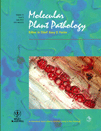
MOLECULAR PLANT PATHOLOGY
Exploring the molecular intricacies of plant pathology.MOLECULAR PLANT PATHOLOGY, published by Wiley, is a leading academic journal in the fields of Agronomy, Molecular Biology, Plant Science, and Soil Science, with a strong reputation underscored by its impressive Q1 rankings across multiple categories and a Scopus rank placing it in the top echelons of its fields. Since embracing Open Access in 2019, this journal has significantly broadened its reach, enhancing visibility and accessibility for researchers, professionals, and students alike. With a commitment to publishing high-quality, innovative research, MOLECULAR PLANT PATHOLOGY serves as a critical platform for advancing our understanding of plant diseases and pathogenesis, contributing to the development of sustainable agricultural practices. As a vital resource for scholarly communication, it fosters collaboration among scientists and supports the sharing of vital knowledge that addresses issues of global food security and environmental health.
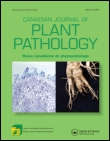
CANADIAN JOURNAL OF PLANT PATHOLOGY
Elevating the understanding of plant diseases for a sustainable future.Canadian Journal of Plant Pathology, published by Taylor & Francis Inc, is a leading academic journal dedicated to advancing the field of plant pathology, with a significant focus on the interplay between plant health and environmental factors. Established in 1979, this journal has established a reputation for high-quality research, currently holding a commendable impact factor within its category. As of 2023, it ranks in the Q2 quartile for both Agronomy and Crop Science as well as Plant Science, highlighting its importance and influence in these domains. With an impressive ranking of 142/516 in Plant Science and 115/406 in Agronomy and Crop Science according to Scopus, the journal is positioned within the 72nd and 71st percentiles, respectively. The Canadian Journal of Plant Pathology serves as a vital platform for researchers, professionals, and students aiming to contribute to the understanding of plant diseases, fostering innovation and development in agricultural practices.
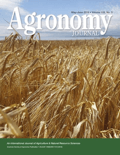
AGRONOMY JOURNAL
Advancing Sustainable Agriculture Through Innovative ResearchThe Agronomy Journal, published by Wiley, is a leading platform for cutting-edge research in the field of agronomy and crop science. Established in the United States, this prestigious journal carries the ISSN 0002-1962 and E-ISSN 1435-0645, with its coverage spanning from 1976 to 2024, showcasing a wealth of knowledge over decades. The journal is recognized in the top quartile (Q1) of its category, making it a highly respected source for quality literature, ranking #108 out of 406 in the Scopus database and reflecting a 73rd percentile standing in agricultural and biological sciences. While it operates under traditional access options, its commitment to disseminating valuable scientific inquiry aligns with the objectives of advancing sustainable agricultural practices globally. The Agronomy Journal serves as an indispensable resource for researchers, professionals, and students eager to stay abreast of significant advancements and discussions influencing the future of crop science and agronomic research.
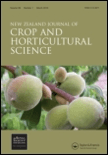
NEW ZEALAND JOURNAL OF CROP AND HORTICULTURAL SCIENCE
Advancing Agricultural Insights for a Sustainable FutureThe New Zealand Journal of Crop and Horticultural Science, published by Taylor & Francis Ltd, stands as a key resource in the fields of Agronomy and Horticulture, with a commendable impact factor reflecting its quality and influence in the scientific community. Since its inception in 1989, this journal has been committed to advancing our understanding of crop development and horticultural practices, catering not only to researchers and professionals but also to students eager to delve into the intricacies of plant sciences. With a Q3 ranking in both Agronomy and Crop Science and Horticulture as of 2023, the journal occupies a significant position within the agricultural and biological sciences domain, significantly contributing to the body of knowledge in these fields. The journal features original research, reviews, and technical notes that cover a wide range of topics, ensuring a comprehensive perspective on contemporary and emerging agricultural issues. For individuals interested in accessing cutting-edge research, the journal provides subscription-based access, further enhancing its scholarly contributions.

Phytopathology Research
Innovating solutions for global agricultural challenges.Phytopathology Research, published by SPRINGERNATURE, serves as a vital resource in the rapidly evolving fields of biochemistry, genetics, molecular biology, and plant sciences. Since adopting an open access model in 2019, this journal has fostered an inclusive approach to disseminating cutting-edge research and breakthroughs in plant pathology and related disciplines. With an impressive impact factor in the second quartile for Biochemistry, Genetics and Molecular Biology (miscellaneous) and Plant Science, and a robust standing in the Scopus rankings, it attracts high-quality contributions from researchers around the globe. The journal not only supports the academic community's quest for advanced knowledge but also plays a crucial role in addressing global agricultural challenges through innovative research. Positioned in the United Kingdom and operating with a keen focus on enhancing plant health and resistance, Phytopathology Research continues to be an essential platform for both established and emerging scientists in this vital area of study.

PESQUISA AGROPECUARIA BRASILEIRA
Empowering researchers to tackle global agricultural challenges.PESQUISA AGROPECUARIA BRASILEIRA, an esteemed journal published by EMPRESA BRASIL PESQ AGROPEC, serves as a vital platform for disseminating research in the realms of agronomy, animal science, horticulture, and soil science. With an ISSN of 0100-204X and an e-ISSN of 1678-3921, this Open Access journal has been at the forefront of agricultural research since its initiation in 1978, and has been fully accessible to researchers globally since 1999. Hailing from Brazil, it is dedicated to advancing knowledge in agricultural practices and sustainability, making it an essential resource for academics and professionals alike. The journal is ranked in the Q3 and Q4 quartiles across various categories, reflecting its impact within the scientific community, while its Scopus rankings illustrate its commitment to high-quality scholarship. With its rigorous peer-review process, PESQUISA AGROPECUARIA BRASILEIRA not only promotes scholarly engagement but also plays a crucial role in addressing agricultural challenges, thus appealing to a broad audience of researchers, professionals, and students seeking to contribute to this dynamic field.

PHYTOPATHOLOGY
Empowering researchers to combat plant diseases.PHYTOPATHOLOGY, published by the American Phytopathological Society, is a premier journal dedicated to advancing the science of plant pathology. With an ISSN of 0031-949X and E-ISSN 1943-7684, this journal has been a cornerstone of scholarly communication in the field since its inception in 1946. Ranked in the top quartile (Q1) in both Agronomy and Crop Science and Plant Science for 2023, PHYTOPATHOLOGY has garnered notable recognition with Scopus ranks placing it at #86/516 (83rd percentile) in Plant Science and #69/406 (83rd percentile) in Agronomy and Crop Science. The journal publishes high-quality research articles, reviews, and case studies that explore innovative solutions to plant diseases, thereby supporting agricultural productivity and sustainability. While currently not an open-access journal, it offers vital insights and findings that are invaluable to researchers, professionals, and students aiming to advance their knowledge and contribute to the field of plant sciences.
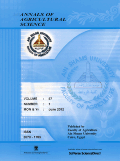
ANNALS OF AGRICULTURAL SCIENCES
Empowering the Agricultural Community Through Open Access ResearchANNALS OF AGRICULTURAL SCIENCES, published by Elsevier, stands as a leading open access journal dedicated to the multifaceted field of agricultural sciences. Since its inception in 2011, this journal has served as a pivotal platform for the dissemination of high-quality research, covering areas such as agronomy, animal science, horticulture, food science, plant science, and soil science. With an impressive Q1 ranking across multiple disciplines and notable positions in Scopus Ranks—including #6 in Animal Science and Zoology and #3 in Horticulture—this journal is recognized globally for its significant contribution to advancing agricultural innovations. The journal caters to a diverse audience of researchers, professionals, and students, providing them with open access to cutting-edge studies that address critical issues in agricultural productivity and sustainability. Its commitment to high-impact research ensures that articles contribute meaningfully to the scientific community, fostering advancements in agricultural practices and policies.

CANADIAN JOURNAL OF PLANT SCIENCE
Fostering Collaboration in Plant Research ExcellenceCanadian Journal of Plant Science (ISSN: 0008-4220, E-ISSN: 1918-1833) is a prestigious publication dedicated to advancing research in the fields of agronomy, horticulture, and plant science. Published by Canadian Science Publishing, this journal has been a cornerstone in the Canadian and international scientific community since its inception in 1973. With a solid presence in reputable databases, it ranks in the Q3 category for multiple disciplines as of 2023, reflecting its impact and relevance within the agricultural sciences. The journal serves as a vital resource for researchers, professionals, and students, encouraging the dissemination of innovative findings and fostering collaboration across disciplines. Although it is not an open-access journal, subscribers gain exclusive access to a wealth of knowledge, with articles aiming to enhance the understanding of plant systems and contribute to sustainable agricultural practices. The Canadian Journal of Plant Science remains committed to supporting the growth of plant-related research and its practical applications in today's changing environmental landscape.

International Journal of Plant Production
Fostering dialogue and discovery in agronomy and crop science.International Journal of Plant Production, published by SPRINGER in Switzerland, serves as a leading platform for the dissemination of innovative research in the fields of Agronomy, Crop Science, and Plant Science. With an ISSN of 1735-6814 and an E-ISSN of 1735-8043, this journal has maintained its reputation by achieving a Q2 quartile ranking in both categories as of 2023, alongside notable Scopus rankings placing it in the top quartiles of its fields (Rank #105/516 and Rank #88/406, respectively). The journal's scope encompasses a wide array of topics vital to sustainable agriculture and plant production systems, making it a critical resource for researchers, professionals, and students striving for advancements in these disciplines. By fostering open scientific dialogue and supporting cutting-edge research, the International Journal of Plant Production is committed to contributing to the resolution of global food security challenges, enhancing agricultural practices, and promoting ecological sustainability.